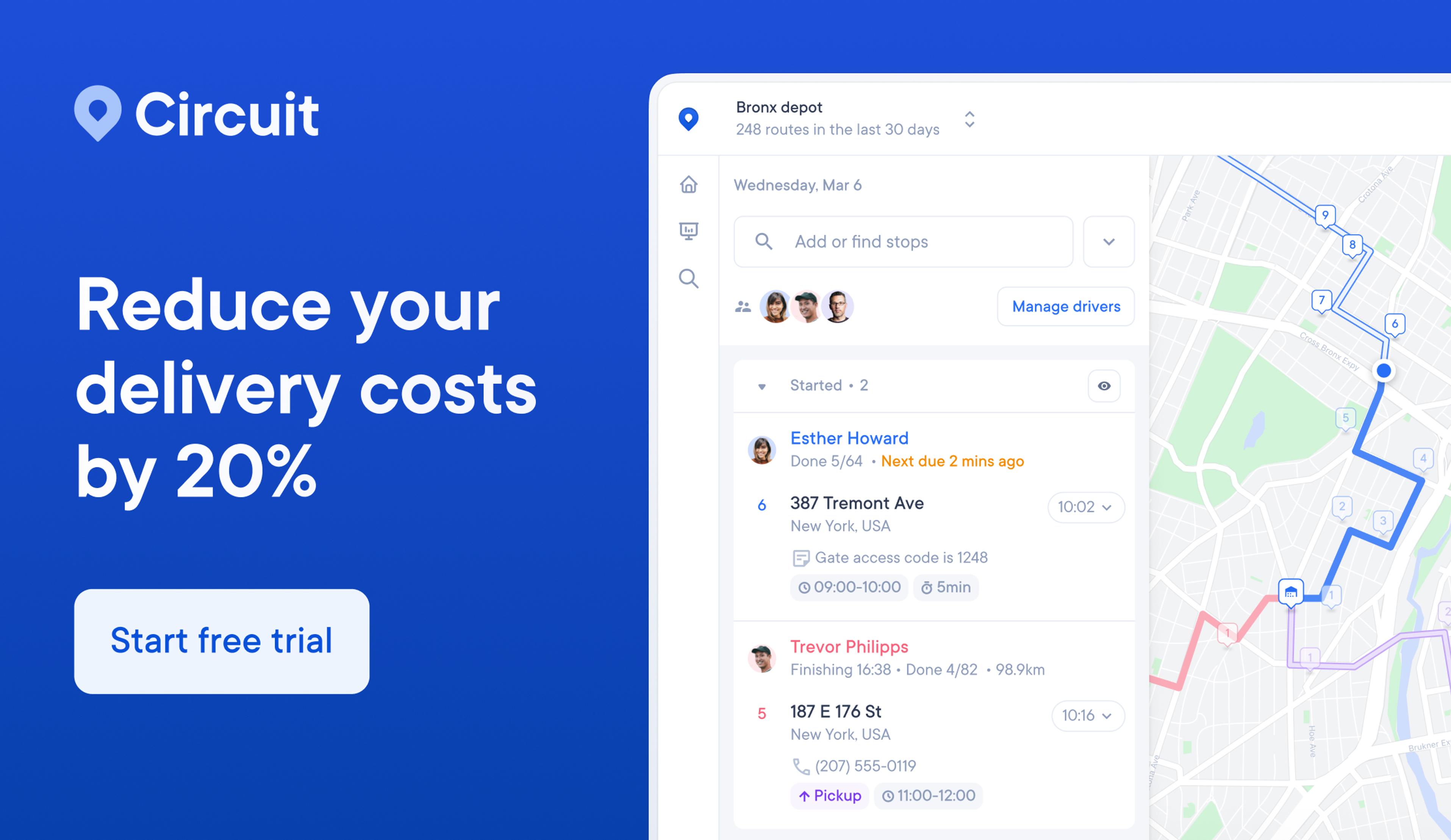A Comprehensive Guide to Starting Your Own Tow Truck Service

Streamline your tow truck business's operations and maximize efficiency with Circuit for Teams.
In today's fast-paced world, the demand for reliable roadside assistance and towing services is more significant than ever. Tow truck businesses offer a vital service to motorists and present a robust entrepreneurial opportunity.
Starting your own tow truck service involves a unique blend of logistical management, customer service, and problem-solving.
This comprehensive guide will navigate the process of establishing your tow truck business. From understanding the fundamental requirements and regulations of the towing industry to effective management strategies and growth opportunities, I'll explore every aspect to help you build a successful, resilient, and customer-focused towing service.
Whether you're a seasoned entrepreneur or new to the world of small business, this guide offers valuable insights and practical advice to steer your venture toward success.
Key takeaways
- A well-crafted business plan, including choosing the right type of tow truck, understanding the market, and outlining financial projections, lays the foundation for a successful tow truck service.
- Navigating legal requirements, from getting the necessary licenses and permits to understanding tax obligations, is crucial. Effective financial management, including budgeting and exploring financing options, underpins business stability.
- Prioritizing efficient, safe towing practices and investing in regular training and appropriate equipment are key to building a reputable and customer-centric towing service.
- Building partnerships with local businesses and law enforcement and implementing robust operational strategies, including the use of technology for scheduling and real-time communication, are vital for growing and sustaining the business.

Understanding the towing industry
The towing industry offers a range of diverse services fitting different needs.
One of most common types of towing equipment includes the flatbed tow truck, ideal for transporting damaged or high-end vehicles by carrying the vehicle on its platform, creating a damage-free journey. Wheel lift tow trucks are suited for short-distance towing, lifting the vehicle by the wheels while leaving the other pair on the road.
Tow truck drivers are not only responsible for safely transporting vehicles but also for providing roadside assistance, which can range from jump-starting a car to changing a flat tire. Drivers need a blend of mechanical knowledge, customer service skills, and the ability to work under challenging and often stressful conditions.
The demand for towing services is consistently high, driven by instances such as vehicle breakdowns, accidents, and impoundment needs.
Roadside assistance remains a critical service, making it a reliable source of revenue. Impound services, involving the removal of illegally parked or abandoned vehicles, means drivers must be knowledgeable about legal protocols and local regulations.
Understanding these aspects is crucial for anyone looking to start a successful tow truck service, as they form the foundation of what the business will offer and how it will operate.
Planning your tow truck business

Drafting a comprehensive business plan is the first crucial step in launching your tow truck service — after coming up with a catchy business name, of course.
This plan should outline your business objectives, target market, service offerings, pricing strategy, marketing approach, and financial projections. It guides your business decisions and helps secure financing.
When considering business models in the towing industry, you have options like operating independently, contracting with municipalities for impound services, or working with motor clubs and repair shops.
An independent model offers more control and flexibility, while contracting can give steady work, usually at lower rates. Collaborating with motor clubs or repair shops can create a consistent flow of clients, though it may involve adherence to specific guidelines and fees.
Startup costs are a significant consideration. New tow trucks offer the latest technology and fewer maintenance concerns but come with a higher price tag. Used tow trucks can be cost-effective but may need more upkeep.
Additionally, consider costs for licensing, insurance, employee wages, and a property for operations.
Your business structure affects taxation, liability, and your level of control. A sole proprietorship is simple to set up but doesn’t include personal liability protection. A limited liability company (LLC) gives liability protection and flexible tax options but involves more complexity in setup and management.
Carefully weigh these options to choose the structure that best suits your business goals and risk tolerance. Planning your tow truck business with these considerations in mind will set a solid foundation for a sustainable and profitable venture.
Legal and regulatory requirements
Navigating the legal and regulatory landscape is essential for operating a tow truck business. Compliance verifies legality and builds credibility and trust with clients.
- Business license. Obtain a general business license from your local city or county government office. This is the primary permit for operating a business in your area.
- Commercial driver's license (CDL). For operating tow trucks, drivers often need a CDL. The specific class of license depends on the truck size and type.
- Towing-specific permits. Some areas have additional permits specific to towing services. Check with local authorities for such requirements.
Start by contacting your local city or county clerk's office for business licenses and your state's Department of Motor Vehicles (DMV) for information on CDL requirements.
Zoning laws and local regulations:
- The zoning laws in your area determine where you can legally park your tow trucks when not in use.
- Be aware of any local regulations that govern towing operations, including hours of operation, parking, and impound protocols.
Registering the business:
- Decide on your business structure (sole proprietorship, LLC, etc.) and register accordingly.
- Register for an Employer Identification Number (EIN) through the IRS for tax purposes, especially if you plan to hire employees.
Understanding tax obligations:
- Familiarize yourself with federal, state, and local tax requirements. This includes income tax, payroll tax (if you have employees), and any other relevant business taxes.
- Consider consulting with a tax professional to confirm compliance and take advantage of potential tax benefits.
Department of Transportation (DOT) standards:
- Tow trucks are subject to DOT regulations, which include safety standards and regular inspections.
- Verify compliance with DOT standards for vehicle maintenance, driver safety, and operational procedures.
Compliance with these legal and regulatory requirements is crucial for the smooth operation of your tow truck business.
Financial management
Effective financial management is the backbone of any successful business, and tow truck services are no exception. Here are key considerations for managing your business's finances:
Setting up a business bank account:
- Choose the right bank. Look for a bank with experience serving small businesses by offering beneficial features like low fees, online banking, and good customer service.
- Segregate business and personal finances. Open a separate account for your business to simplify accounting and tax processes.
- Necessary documentation. Generally, you'll need your business registration documents, EIN, and personal identification to open an account.
Handling business finances:
- Budgeting. Create a detailed budget with all potential expenses, such as vehicle maintenance, fuel, employee salaries, insurance, and marketing costs.
- Cash flow management. Monitor your cash flow regularly to make sure you can cover your operational costs and identify areas where you can reduce expenses.
- Financial software. Invest in good accounting software to keep track of income, expenses, and tax obligations.
Financing options:
- Business loans. Banks and credit unions offer loans specifically for small businesses. Be prepared with a solid business plan and good credit history to increase your chances of approval.
- Equipment financing. If you need to purchase tow trucks, equipment financing can be a viable option. This often includes a down payment and offers the equipment itself as collateral.
- Alternative financing. Consider other options like line of credit, merchant cash advances, or crowdfunding, especially if traditional loans are not feasible.
Managing business expenses:
- Negotiate with vendors. Try to negotiate better rates with suppliers for parts, equipment, and services.
- Regular expense review. Regularly review and categorize expenses to identify areas where you can cut costs without impacting service quality.
- Plan for major expenses. Set aside funds for significant future expenses, such as new tow trucks, to avoid financial strain.
By managing your finances, you can maintain a healthy cash flow, support business growth, and navigate any financial challenges your tow truck business may face.
Insurance and liability

Insurance is a critical aspect of any tow truck business. Understanding and obtaining the right types of insurance is essential for legal compliance and financial security.
Types of insurance needed:
- Liability insurance. Covers damages or injuries to others caused by your business operations. This is the most basic and essential insurance for a tow truck business.
- Physical damage insurance. Protects your tow trucks and equipment from damage due to accidents, theft, or natural disasters.
- Garage keepers insurance. If you store customer vehicles, this insurance covers damage to those vehicles while in your custody.
- Workers' compensation. Mandatory if you have employees, it covers medical expenses and lost wages for work-related injuries or illnesses.
Choosing the right liability insurance policy:
- Assess your risks. Consider the specific risks associated with your tow truck operations, such as the types of vehicles you tow and the areas you service.
- Coverage limits. Make sure the policy covers the maximum potential losses you could face. Higher coverage limits mean higher premiums but more protection.
- Policy terms and conditions. Understand the exclusions and limitations of the policy. Look for any specific requirements or restrictions that could affect your business.
Working with insurance companies:
- Shop around. Compare policies from multiple insurance providers to find the best coverage at a competitive price.
- Build a relationship. Establishing a good relationship with your insurance provider can be beneficial, especially when handling claims.
- Prompt reporting. In the event of an incident, report it to your insurance company as soon as possible. Delay in reporting can complicate the claims process.
Handling claims:
- Documentation. Keep thorough records of incidents, including photos, police reports, and witness statements, to support your claim.
- Understand the process. Familiarize yourself with your insurance company's claims process for efficient and timely handling.
- Professional advice. Consider consulting with an insurance adjuster or legal professional for significant claims to make sure your interests are adequately represented.
By securing the right insurance coverage and understanding how to work effectively with insurance companies, you can protect your tow truck business from significant financial losses and liabilities.
Equipment and fleet management
When selecting tow trucks and equipment, it's crucial to assess types of services you plan to offer, such as roadside assistance or vehicle recovery.
Flatbed trucks are suitable for most towing situations, while wheel lift trucks are more economical and better suited for dense urban environments. Additionally, investing in quality towing accessories like straps, winches, and emergency lights is essential for the safety and efficiency of your operations.
Implement a regular maintenance schedule for each vehicle prevents breakdowns and extends their operational life. Keep detailed records of maintenance, repairs, and inspections for each vehicle to track expenses and plan future maintenance.
Fleet management software can be a valuable tool to monitor vehicle locations, maintain schedules, and assist with efficient dispatching.
Towing oversized vehicles comes with its own set of challenges. It needs the right heavy-duty tow trucks and specific training and safety protocols for drivers.
Additionally, towing larger vehicles often involves navigating legal compliance, such as special permits or specific routing requirements, which can vary by state or municipality.
Human resources
Finding the right candidates involves looking for individuals with not just the necessary driving skills but also the ability to handle stressful situations and give excellent customer service.
During the hiring process, prioritize candidates with a clean driving record and the appropriate driver's licenses, such as a commercial driver's license (CDL) for heavy tow trucks.
Once hired, employee training should cover operational procedures, safety protocols, and customer service skills. Regular refresher courses keep skills sharp and up to date with any new regulations or equipment.
Certifications can enhance a driver’s skills and the business’s credibility. Encourage your drivers to obtain certifications from recognized towing and recovery training programs, which cover advanced safety, recovery techniques, and customer service skills.
Understanding and adhering to employment laws is also crucial. This includes compliance with labor laws regarding wages, hours, and working conditions.
Stay informed about the laws in your jurisdiction and consult with a human resources professional or attorney to confirm compliance with federal and state regulations.
Building clientele and partnerships
Develop a robust marketing strategy that leverages both traditional and digital platforms. Utilize local advertising, such as radio spots or newspaper ads, to reach a broad audience in your area.
Embrace digital marketing by creating an online presence with a professional website, using social media, and leveraging targeted online advertising. Promotions or loyalty programs can also attract new customers and retain existing ones.
As a business owner, establishing partnerships with local businesses, such as auto repair shops or car dealerships, can create a steady stream of referrals. Collaborating with law enforcement agencies can also open opportunities for towing contracts, particularly for impound services.
These partnerships not only bring in regular business but also build credibility and trust in your services within the community.
Operational strategies
For any new business in the towing sector, establishing robust operational strategies promotes efficient, safe, and compliant services. This is particularly vital for a towing business venture, where the safety of towing vehicles, operators, and the vehicle owners' property is paramount.
Best practices for efficient and safe towing services:
- Type of tow truck selection. Choose the right type of tow truck for the job. A flatbed is ideal for transporting damaged or all-wheel-drive vehicles, whereas a wrecker may be better for urban environments or repossessions.
- Comprehensive training. Regular training sessions for operators are essential to maintain safety standards and operational efficiency. This includes handling different types of towing vehicles and understanding the capabilities and limitations of each tow truck in your fleet.
- Real-time communication. Implementing real-time communication tools can enhance the efficiency of your operations. This keeps your team and vehicle owners updated about the status of service requests.
Day-to-day management of a tow truck company:
- Scheduling and dispatch. Use advanced scheduling and dispatch software to manage service requests efficiently. This helps assign the right type of tow truck and operator for each job based on location, vehicle type, and service needed.
- Maintaining vehicle permits and insurances. Confirm your towing vehicles are compliant with necessary vehicle permits and insurances. This step complies with legal requirements and assures vehicle owners of your business entity's professionalism.
- Financial transactions. Integrate seamless credit card processing systems for easy billing and payments, creating convenience for your customers and efficiency for your business.
Handling sensitive issues like private property tows and impound services:
- Clear policies and communication. Establish clear policies for private property tows and impound services that align with local regulations. Transparent communication with property owners and vehicle owners is key to handling these sensitive situations.
- Legal compliance. Stay informed and compliant with the laws governing private property towing and impound services. This includes understanding the rights of vehicle owners and property owners.
- Documentation and evidence. Maintain detailed records and photographic evidence for each tow, especially in situations involving impounds or private property. This documentation is crucial for resolving disputes and proving compliance with laws and regulations.
By focusing on these operational strategies, your tow truck company can give top-notch services, maintain a positive reputation, and create a long-term business venture.
Steering toward success in the tow truck industry
Embarking on your journey in the tow truck industry as a new business venture can be both challenging and rewarding.
Success in this dynamic field is built on a foundation of comprehensive planning, legal and financial vigilance, dedication to quality service and safety, and the ability to build lasting relationships. In this journey, Circuit for Teams can enhance the efficiency of your operations.
Its features, designed to optimize route planning and dispatch, meet the operational needs of a tow truck business. The real-time tracking and efficient route optimization of Circuit for Teams streamlines your processes, saves time and resources, and helps your business runs as smoothly as your tow trucks.
Steer your tow truck business toward success. Discover how Circuit for Teams can support your growth and operational excellence.
"As a dispatch manager, I've found that Circuit for Teams significantly enhances our daily operations. Its intuitive dispatch dashboard simplifies the management of our drivers and routes. The GPS driver app ensures that drivers are well-informed on the road, reducing miscommunication and delays. CFT's route optimization not only saves time but also reduces fuel costs, making it indispensable for our growing courier business."

Jack Smith
Dispatch Manager, Speedy Couriers
"CFT has been a game-changer for our medium-sized courier company. The ability to handle multiple drivers and adjust routes on the fly directly from the dashboard allows us to respond quickly to any logistical challenges. Features like real-time tracking and automated customer notifications keep everyone in the loop, enhancing our service reliability and customer satisfaction."

Sarah Jones
Logistics manager, FasterDelivery Couriers


